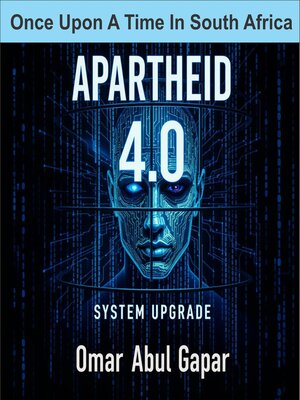
Sign up to save your library
With an OverDrive account, you can save your favorite libraries for at-a-glance information about availability. Find out more about OverDrive accounts.
Find this title in Libby, the library reading app by OverDrive.



Search for a digital library with this title
Title found at these libraries:
| Library Name | Distance |
|---|---|
| Loading... |
In a stark and urgent warning, this book posits that the explicit racism of twentieth-century Apartheid has not vanished but has instead undergone a sinister strategic upgrade. The foreword introduces the central, chilling thesis: a new, more insidious system of control, dubbed Apartheid 4.0, has been silently installed across South Africa and the continent. Engineered for the digital age, this system no longer relies primarily on skin color. It operates through meticulously manufactured divisions of nationality, ethnicity, and class, all while cynically co-opting the language of liberation, economic freedom, and radical decolonization to achieve the same old ends: the perpetual weakening of the African majority and the consolidation of power and resources by a neo-colonial elite.
The book first travels back to the original source code of African subjugation, the 1884 Berlin Conference. It dissects the deliberate, cartographic violence inflicted by European powers as they carved a continent into exploitable colonies, using arbitrary borders to split cohesive nations and fuse rival groups. This chapter establishes "Divide and Conquer" as the foundational algorithm of colonial rule, later perfected internally by the Apartheid regime through its Bantustan system. The methodology of weaponizing religion and culture to create a "colonized mind" is revealed as the essential first step in any system of control.
A terrifying case study is then presented: the 1994 Rwandan Genocide. This event is framed not as a spontaneous African tragedy but as the world's most successful and brutal live-fire test of the Apartheid 4.0 core programming. The book meticulously documents how German and Belgian colonizers designed the racialized Hutu and Tutsi identities from fluid social classes, issuing ethnic identity cards and fostering a hierarchy of resentment. It identifies the colonial and post-colonial designers who refined this hatred into a scalable system of mass mobilization, proving that engineered ethnic conflict could be a precise and devastating tool for achieving political ends.
The synopsis then introduces the shadowy consortium of modern designers, a network of aging Apartheid-era strategists, global neoliberal economists, multinational corporation heads, and local comprador elites. Their shared goal is to prevent the rise of a united, economically powerful Black majority in South Africa. The new architecture leverages twenty-first-century tools, including nationalism to redirect post-colonial patriotism into hostility against other Africans, xenophobia to frame the foreign national as an existential economic and cultural threat, and class warfare to systemically direct the rage of the impoverished not upward at the economic system but sideways at the foreign shopkeeper or neighbor.
Finally, the book outlines the brutal rollout of this system. The implementers are not just politicians but algorithms and influencers. It details how social media platforms are weaponized, their engagement-driven algorithms perfectly suited for spreading anti-immigrant propaganda and organizing violent movements. Political fronts are created, appearing as organic, grassroots movements while being strategically guided to channel popular frustration. Deliberate state neglect of townships and service delivery creates the necessary tinderbox of frustration, ready to be lit by a single spark. This is a chilling examination of how old hatreds are being systematically recoded for a new era, threatening to plunge nations into a future of perpetual, digitally-fueled conflict.







